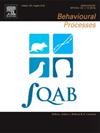Does predation environment affect repeated responses to predation cues in the fish Brachyrhaphis rhabdophora?
IF 1.3
4区 生物学
Q4 BEHAVIORAL SCIENCES
引用次数: 0
Abstract
More time spent by prey avoiding predators often results in less time allocated to energy acquisition and reproductive-related activities. Thereby, individuals that optimize this trade-off and respond appropriately to current risk levels in their environment should be at an advantage. But how does this tradeoff change when individuals repeatedly encounter predation threats? There may be advantages to prey by modulating behavior in response to repeated exposures to a threat. Moreover, it is unclear how evolutionary history of a population might affect such individual responses. Our study addressed two questions: (1) how does the fish Brachyrhaphis rhabdophora respond to repeated predation cues; and (2) do responses to repeated cues differ based on predation environment? To answer these questions, we repeatedly exposed B. rhabdophora individuals from high- and low-predation populations to a chemical predation cue. We measured the change in total distance traveled during 15-minutes before and after each cue exposure and compared the proportional change in response of each successive cue. We found that fish from both populations responded consistently to each of the four successive cue exposures. These results provide insights in understanding how both recent risk exposure and evolutionary history of risk influence individual response to threats over time.
捕食环境是否影响横纹短尾鱼对捕食线索的重复反应?
猎物躲避捕食者花费的时间越多,分配给能量获取和繁殖相关活动的时间就越少。因此,优化这种权衡并对其环境中的当前风险水平作出适当反应的个人应该处于优势地位。但是,当个体反复遭遇捕食威胁时,这种权衡是如何改变的呢?对反复暴露于威胁的猎物来说,调整行为可能是有利的。此外,目前还不清楚种群的进化史如何影响这种个体反应。我们的研究解决了两个问题:(1)横纹鱼(Brachyrhaphis rhabdophora)如何对重复的捕食线索做出反应;(2)不同的捕食环境对重复提示的反应是否不同?为了回答这些问题,我们从高捕食种群和低捕食种群中反复暴露横纹圆蝽个体到化学捕食线索中。我们测量了每次线索暴露前后15分钟内总距离的变化,并比较了每次连续线索反应的比例变化。我们发现,这两个种群的鱼对连续四次的线索暴露都有一致的反应。这些结果为理解最近的风险暴露和风险进化史如何随着时间的推移影响个体对威胁的反应提供了见解。
本文章由计算机程序翻译,如有差异,请以英文原文为准。
求助全文
约1分钟内获得全文
求助全文
来源期刊

Behavioural Processes
生物-动物学
CiteScore
2.70
自引率
7.70%
发文量
144
审稿时长
4-8 weeks
期刊介绍:
Behavioural Processes is dedicated to the publication of high-quality original research on animal behaviour from any theoretical perspective. It welcomes contributions that consider animal behaviour from behavioural analytic, cognitive, ethological, ecological and evolutionary points of view. This list is not intended to be exhaustive, and papers that integrate theory and methodology across disciplines are particularly welcome.
 求助内容:
求助内容: 应助结果提醒方式:
应助结果提醒方式:


